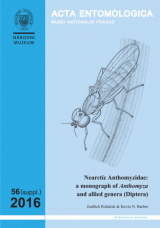Acta Entomologica Musei Nationalis Pragae
2016
Volume 56 - Supplementum
published on: 30th December 2016
Abstract: Nearctic Anthomyzidae of the Anthomyza clade comprising the genera Fungomyza Roháček, 1999 (1 species), Ischnomyia Loew, 1863 (1 species), Arganthomyza Roháček, 2009 (7 species) and Anthomyza Fallén, 1810 (18 species) are monographed. A review of the history of taxonomic research of the Nearctic Anthomyzidae and of the adult morphology are given. All included taxa are treated systematically, with complete data on nomenclature, type material, taxonomy (diagnoses and (re)descriptions, keys, illustrations of taxonomically important structures), relationships, biology and distribution. The concept of Ischnomyia is redefined and its Nearctic species are revised and redescribed as are all those of Anthomyza; species of the remaining two genera are reviewed. Ischnomyia spinosa Hendel, 1911 syn. nov., is a new junior synonym of Arganthomyza vittipennis (Walker, 1857) comb. nov., the latter being resurrected from synonymy with Ischnomyia albicosta (Walker, 1849), transferred to Arganthomyza and redescribed. The E. Palaearctic species I. barbarista (Roháček, 2009) comb. nov. is excluded from the genus Arganthomyza and transferred to Ischnomyia. Fifteen new species of Anthomyza are described, viz. A. oblonga, A. silvatica, A. pengellyi, A. mcalpinei, A. pullinotum, A. occidentalis, A. vockerothi, A. dichroa, A. gibbiger, A. orthogibbus, A. shewelli, A. gilviventris, A. furvifrons, A. vulgaris, A. equiseti spp. nov. and remaining 3 species are redescribed, viz. A. tenuis (Loew, 1863), A. variegata (Loew, 1863) and A. concolor (Thomson, 1869). One neotype (of I. albicosta) and 5 lectotypes are designated. Species groups are redefined and rediagnosed within the genera Arganthomyza and Anthomyza, while the Arganthomyza vittipennis group and Anthomyza tschirnhausi group are newly established. The first modern key to all Nearctic genera of Anthomyzidae is provided. Distributional patterns of species studied are presented using a coarse measure of dissimilarity. Relationships of taxa under study are discussed following a new phylogenetic hypothesis based on cladistic analysis of morphological data of all known species in the Anthomyza clade.
